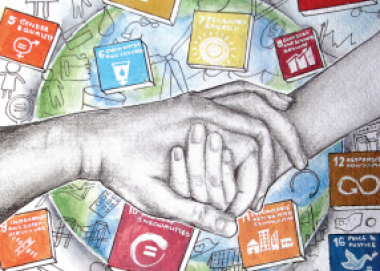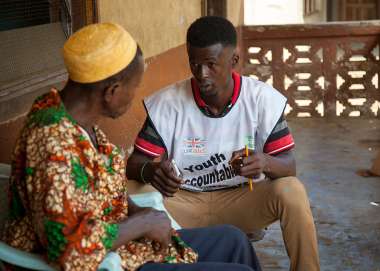Progress towards gender equality is going into reverse. Religious actors are pushing back against hard-won rights. The 64th session of the Commission on the Status of Women (CSW) was due to take place this week at the United Nations' headquarters, but has been postponed by the Covid-19 outbreak. Nonetheless, New York-based delegates are tomorrow due to adopt a political declaration, and the chances are it will water down wording on the realisation of gender equality and women’s rights.
Christian Aid was due to be in New York, joining other women's rights advocates from around the world. Despite the postponement of CSW 64, we will continue to call on faith actors and commission members to take a strong stand for gender equality.
Gender injustice continues to be a controversial issue in many religious and political spaces, with fundamentalist beliefs creating polarisation at local, regional and global levels. At the same time, civic space is shrinking, making the reversal of progress towards reducing inequality, ensuring inclusion and improving sustainability more likely. This has particularly serious effects on the lives of women and girls who, being marginalised, are always at the greatest risk of being ‘left behind’ by development.
According to the World Economic Forum’s Global Gender Gap Reports moves towards gender equality may actually be shifting into reverse. The 2016 report found that progress against gender equality indicators peaked in 2013, but has declined since then, particularly those related to economic participation and opportunities. Projections based on the 2015 report suggested that the economic participation and opportunity gap could be closed within an outrageous 118 years, but the 2020 report estimates it will now take 257 years.
For these reasons, we were heading to New York to lobby parties to the CSW to agree to preserve the call for gender equality as a critical aspect of women’s rights. We believe that if this fails, the UN’s target of achieving the Sustainable Development Goals by 2030 will become even more elusive.
Why is 2020 so important for women’s rights?
This year marks the 25th anniversary of the Beijing Declaration and Platform for Action, a cornerstone of women’s rights. The participation of Christian Aid in processes like the CSW will be crucial in resisting backlashes to hard-won rights, but also in shedding light on the structural causes of poverty and gender inequality.
As we push the acceleration of progress on gender equality and rights, it is necessary to consider the current global context. While there are pockets of positive and transformative change, international affairs today are largely characterised by an erosion of multilateralism and by regression on human rights, often with an ‘unholy’ alliance of ultra-conservative religious actors with economic and political forces that serve each other’s interests.
In response to this backlash, Christian Aid this week launches a new report, Equality at all Levels. Harnessing our decades of experience and building on collaboration with our strategic partners, it calls on faith-based actors to ‘get their own house in order’: to fight against religious fundamentalism; to promote comprehensive approaches to gender justice; and to push for a holistic implementation of all human rights.
The role of faith actors in promoting gender equality
Religion plays a key role in many peoples’ lives: 84% of the world's population associate with a faith. As faith actors, our scriptures inspire us to stand up for justice and defend human rights. We work to address not only the needs of the body, but also those of the mind and spirit, honouring the fullness of humanity.
But we acknowledge that religious institutions, customs and practices have created, reinforced and been shaped by patriarchal structures. The role of progressive religious leaders in combating these unjust systems of oppression has never been more important. This demands that faith actors work both within faith structures and more widely, reaching out and joining forces with secular movements for rights and gender justice.
Justice is at the very heart of Christian faith. It is a fundamental biblical and theological concept. If gender roles are defined to limit and restrict full humanity for women, then this system is not fair, not based on justice.
Women’s rights: where do we stand?
Christian Aid is a faith actor and a member of many networks of secular and faith-based organisations. We are called to work together to respond to global changes. Christian Aid will not remain silent when the roll-back of gender equality threatens progress. Throughout all our policy influencing work, we will focus on critical areas where faith actors are contributing, by calling for:
- Recognition of the diversity of families.
- The end of all forms of violence against women and girls including structural violence.
- Respect for the rule of law through justice-oriented approaches that guarantee the full implementation of human rights at all levels.
In short, we advocate for religious actors to take a positive role in advancing gender justice, lament the fact that human rights are being undermined, and call for greater resources and strategic alliances with faith and secular actors.
Resisting the backlash to move forward
We must resist the pushback on gender equality in order to move forward. Christian Aid urges faith actors, alongside women’s organisations and gender equality advocates, to respond to backlashes against gender equality, challenge fundamentalisms and hold to account the actors responsible for anti-rights movements.
Finally, despite the postponement of CSW 64, we call on all CSW and member states to agree on a political declaration that creates affirmative measures to resist backlashes against gender equality and address the intersecting and structural forms of discrimination that face women and girls.
Follow Marianna on Twitter at @CaidmL



